
Introduction
This revival took place during the closing weeks of 1936, primarily at the World Evangelization Crusade (W.E.C.) mission station in Imbai, on the border if the Inturi Rainforest. The predominant ethnic group in the region was the Budu (Mubudu, Babudu, Mabudu). Another group was the pygmy Mbuti.
Imbai was an ordinary outpost that had established a church and a boys and girls boarding school, besides several outstations. Fifty acres were farmed to supply food, and 60 buildings housed the community of workers.
Even though there had been a powerful revival in the area from 1920-1922, that era had long passed, and sin and coldness had set in.
In 1931 a new mission station leader, Jack Roberts, came with his sisters Lily and Ivy.

What Led to Desperate and Extraordinary Prayer for Revival
The Belgian Colonial Government ordered W.E.C. to reduce their number of mission stations manned by Europeans to twelve. This led W.E.C. to select Imbai as one location that European missionaries would have to vacate.
This was a huge disappointment to the national believers and for the missionaries. The fear was that the mission wouldn’t survive without the Europeans being there.
The immediate need was to transfer leadership of the mission station from the Europeans to the national believers. Both feared the nationals weren’t ready for such responsibilities, and it caused tremendous despair.
In August 1936, Jack Roberts was the first to leave. His sisters Lily and Ivy were to remain six months, making preparation for a total European withdrawal from Imbai.
Many assumed this was the end of all that they had labored to build at Imbai. The national believers saw the departure of Jack, and they knew that when his sisters would depart, everything would come to an end.
Despair Led to Desperation
The bustling activity that had previously filled the Imbai mission station quickly turned to gloom. The depression was felt at every church service and through all their ministry work.
Lily and Ivy saw the potential for one of two things to happen: 1) the mission station would fall to ruin or 2) God would send a “Holy Ghost Revival!” This desperation led them to extraordinary prayer for revival.

The predominant ethnic group in the region was the Budu (Mubudu, Babudu, Mabudu).
Extraordinary Prayer
Faced with the responsibility of preparing the national believers for leadership, the sisters decided to cancel all station activity for three days while the two of them spent their time waiting on God for His guidance.
At the end of the three days, Lily said to her younger sister,
I feel that God has spoken to me. I prayed, ‘Lord, if Thou wouldst only send a revival, a second Pentecost, we would not need to fear that these babes in Christ would go back into heathenism. They would be established in Thee.’
After her prayer, she sensed God speak to her in return:
You have asked a hard thing; nevertheless, if you can pay the price, you may have what you asked.
Lily responded with,
Lord, my life for Revival!
Giving All their Time in Prayer
The two sisters started meetings with Christians who were totally committed to praying for revival. Others who were not willing to discipline themselves in prayer and in waiting upon God for the outpouring of His Spirit were asked to stay away.
Lily and Ivy would rise at 5:30 each morning for prayer; but as the burden for revival increased, the Lord kept waking them earlier and earlier, until they were rising at 2:45.
They would do devotions together, then alone privately until 6:30am. They would then meet with the believers and share what the Lord had showed them from the Word during their devotional time.
With the burden of prayer increasing, Lily and Ivy knew they had to relinquish their oversight of the boys’ and girls’ school but did not want to send the children back to their pagan homes. It was then that two assistant principals came and told them that God had spoken to each one of them individually, and that they were to take full responsibility of the schools so the sisters could give all of their time to prayer.
Beyond just the school, eventually the Budu people began to see the intensity and time commitment the sisters were spending in prayer for them, and for their future. This led them to begin taking over all responsibilities at the mission station. That also applied to carrying out evangelistic ministry in the surrounding region.
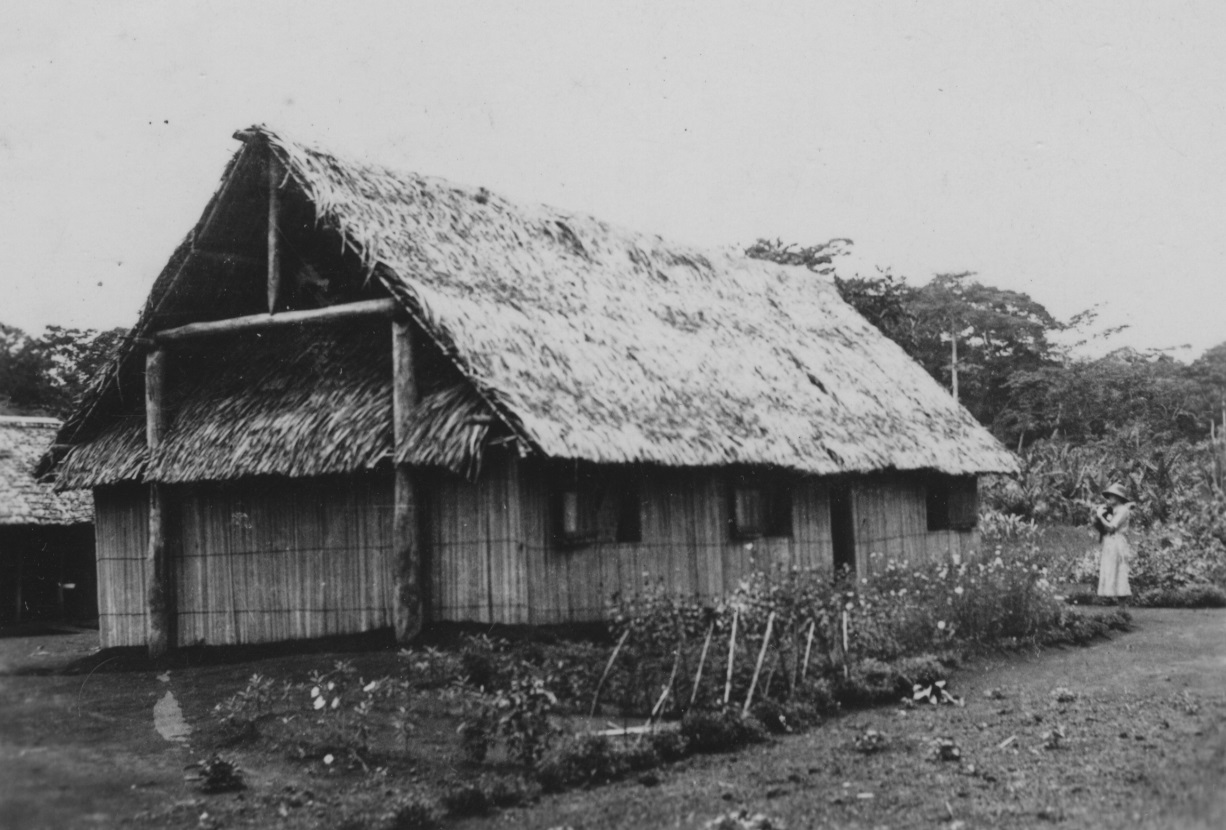
Lilly, a missionary holding her cat in front of her home (circa 1930) *
Two Meetings per Day for Eleven Weeks
As the awareness of the presence of God increased, so did the people’s desire to spend their time in that presence. It was then that the meetings began to be held twice per day, and this went on for eleven weeks. Lily and Ivy alternately ministered the Word of God at these meetings. The messages they were sharing at this time had but one goal—a “Holy Ghost Revival.”
Tormenting Conviction of Sin
The beginning of a genuine revival isn’t the pleasurable experience some assume it to be. They can often be horrifying encounters, as the presence and convicting ministry of the Holy Spirit comes in such overwhelming power that Christians experience an irresistible compulsion to confess their sins, at times even publicly. And they cannot get relief until they do so.
The believers at Imbai experienced this, and they had to deal openly with their criticism, impatience, careless gossip, unkind things they had said and thought about others, their theft, adultery, drunkenness, negligence in daily Bible reading and prayer, etc.
The confessions often led to acts of reconciliation, with people going to the ones they had offended and asking for forgiveness.
A renewed passion for Christ began to settle down upon the believers, and it transferred to the Word of God, which began to take on a new meaning. The sale of Scriptures shot up to twelve times the normal sales rate. It was clear to all that the Bible was no longer just a book.
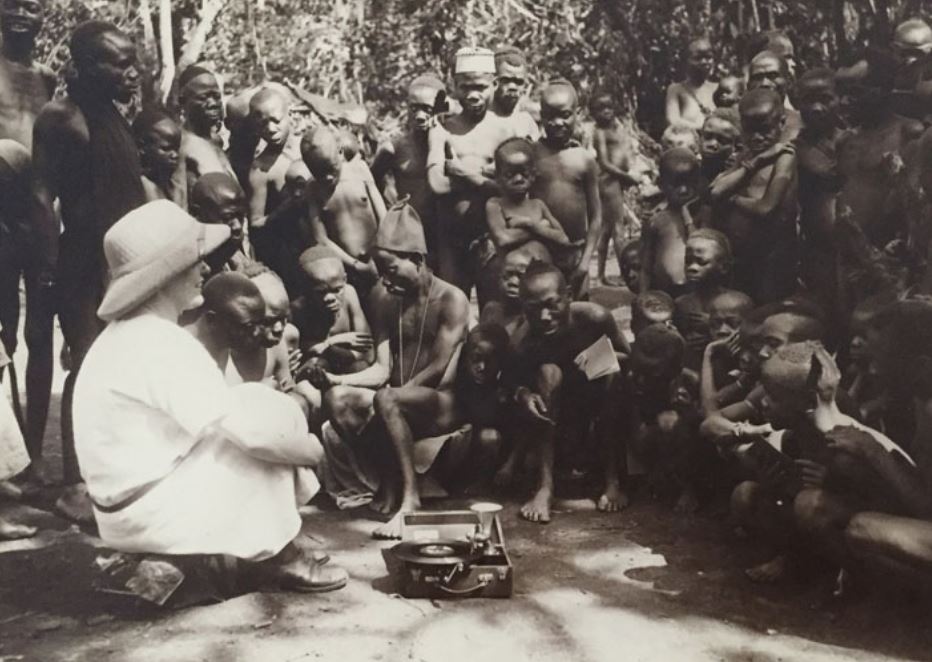
A missionary with those from the Mbuti ethnic group.
Prayer for Salvation
Believers had a new sense of the judgment that was to come upon unbelievers. They also sensed it was their responsibility to see them saved. They then began praying for the conversion of the lost and, when possible, bringing them to the meetings.
People in need of salvation were mentioned by name and prayed for publicly. Those who were prayed for would eventually turn up at the meetings, almost against their wills, disgusted with themselves for coming yet not being able to resist, and they were converted before they returned home.
The results of the prayers were so startling that some were afraid to go to the services. The prayers developed a renown throughout the area that caused people to take notice. One especially evil man, whose wife was recently converted, told her not to pray for him, and to also forbid others to pray for him.
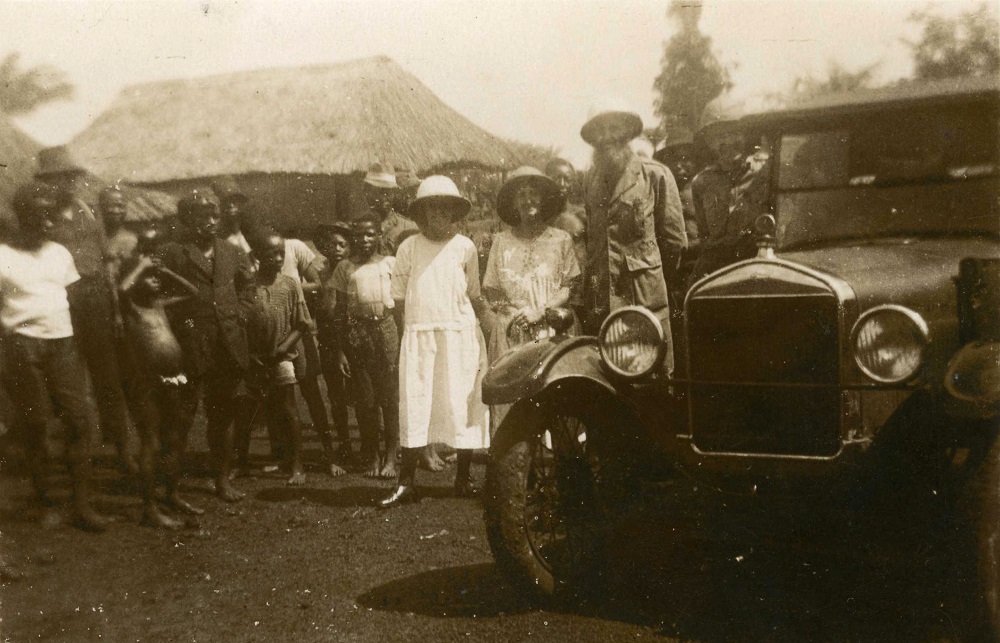
Missionaries arriving at a W.E.C. mission station (CT Studd and wife Priscilla 1928) *
What Happened
A mail courier arrived at a neighboring mission station located about 26 miles from Imbai, and he was asked by the missionary, Charlie Searle, if there had been any new news. The courier then told him how everyone at the Imbai mission station was spending all their time praying or reading the Bible, from early morning till midnight.
Searle assumed the courier was exaggerating until he heard a similar rumor from another source a few days later.
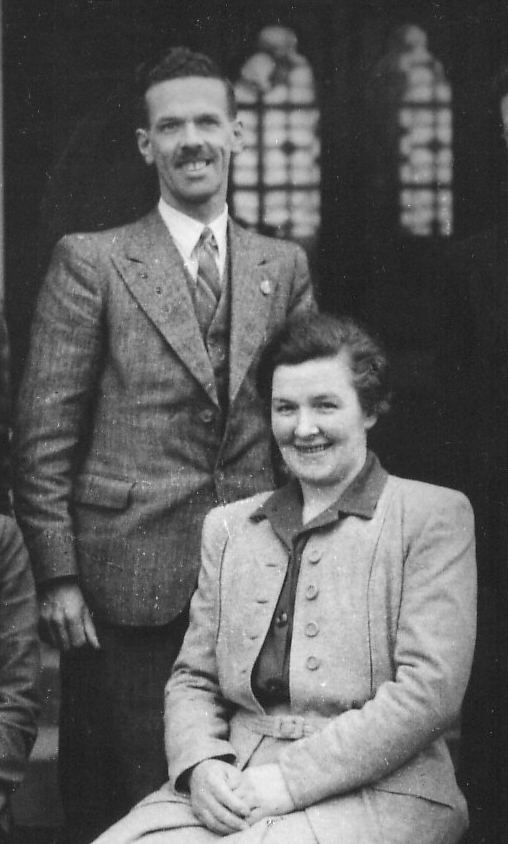
Charles Searle and wife Lily – when running the Elms Home in Arbroath, Scotland – c. 1950 *
A couple weeks later Searle and another missionary, Herman Meyer, decided to make a trip to Imbai to investigate. Upon their arrival at Imbai in the late afternoon, Searle and Meyer began asking questions. Lily Roberts then explained what had been happening, and she added to it a vision she had:
I saw the Lord Jesus and I saw myself standing close by Him. In between was a Mubudu woman I knew well, a lovely Christian; and near to her one of the evangelists; and a group of others behind them. The Lord Jesus spoke to me so clearly, reminding me how He had left His glory and humbled Himself to come to earth as the Son of Man, how He lived in me and lived in them: and yet I was keeping in my heart a difference between us. I was melted to tears by his rebuke, put my arms around the native woman: then took the hand of the evangelist and kissed it, as in the East.
Then the vision left me, but left me weeping bitterly. I was all broken up inside. I could not read the Bible or pray.
Next morning I went to have my quiet time with Ivy as usual. No words came to either of us. I could only see the vision.
I went to the early service and no message prepared. Without going into details, I just told them what had happened, that during the previous night God had reproved me for allowing in my thoughts a barrier between myself and them.
I remember I couldn’t look up while speaking to them; and when I stopped I found that those dear people too had their eyes on the ground. We just seemed all of us bowed with the sense of His presence. God graciously caused us to know in some measure how He loved us and we realized how we loved Him and each other.
Then everyone broke down weeping for pure joy: the whole church was just one big sob—one note of worship. After that we had such perfect fellowship in the Spirit, that I have never experienced anything like it with any group of whites.
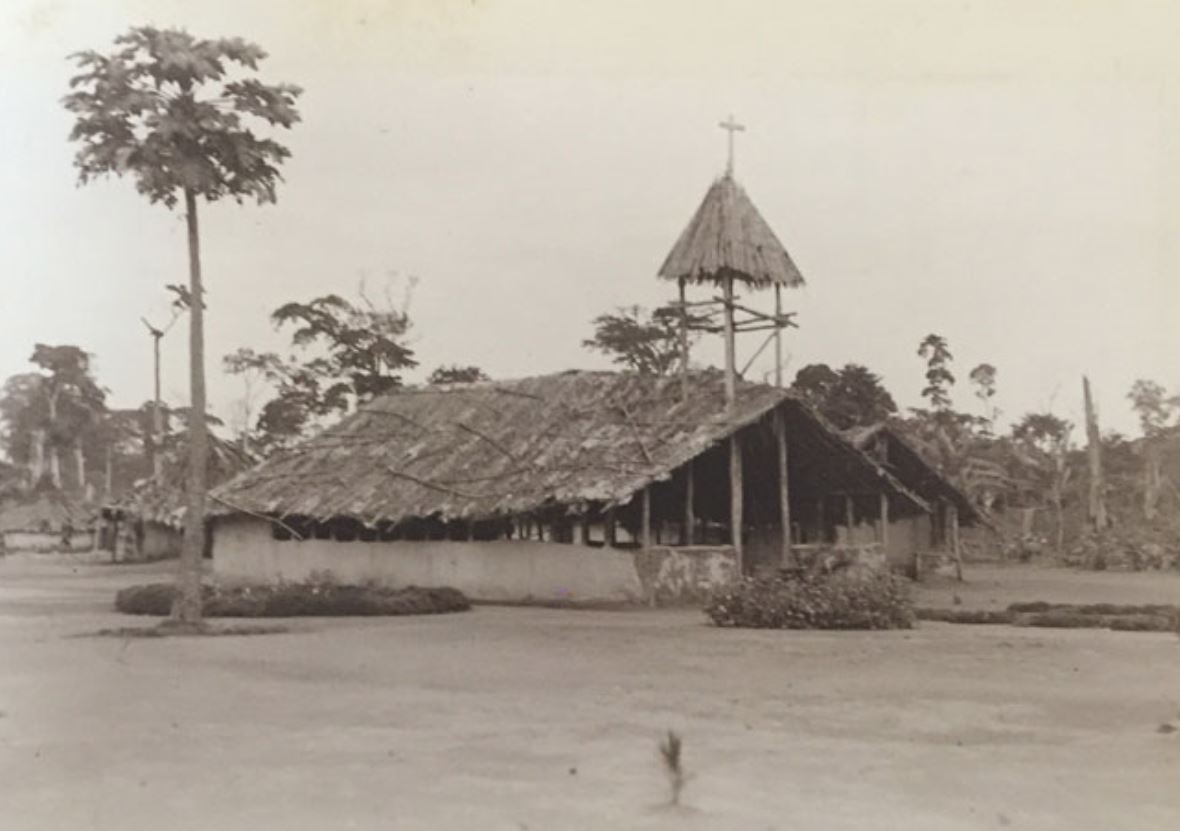
A church in the Congo forest
Revived Praying
After sharing her vision to the two guests, Lily asked the men if she could invite some of the believers to join them in prayer (this was an era when the races were separated during times of prayer). They agreed and 25 were invited to join them.
The prayer meeting continued till midnight. It was an experience Searle and Meyer had never experienced. Searle commented on the prayers:
That prayer meeting will always live in my memory. I had never heard praying quite like that before. It seemed as if a mighty rushing wind had come into our midst. I was mystified, trying to understand. “What is it? What is it?” I felt as if my Christian experience had suddenly become nothing, and my heart had turned to stone. I was in the midst of people who were in the presence of God!
I never heard native women pray like that, and the humility of our two sisters was very touching. It humbled me indeed. I saw the secret and the reality of this movement of the Holy Ghost. It was not the missionaries at all, but God. God first, God last. They were truly living in the very presence of the living Christ.
Meyer’s comments about that prayer meeting were:
I had heard hundreds of natives pray, and amongst them some of our best Christians, but none touched the depths of real praying that souls did that night. It was so evident that something wonderful had taken hold of and now possessed their lives.

W.E.C. Ibambi Mission Station *
Following their prayer meeting, Lily informed Searle that they were starting evangelistic meetings the next morning, and Searle was to be the first speaker. Searle, feeling overwhelmed by what he was witnessing, felt inadequate, and attempted to evade the request. But after having been pressed, he agreed.
The meeting began at 9:00 the next morning, with the church being filled with over 1,000 people. Lily, just a few moments before the service started, told Searle that God gave her a word, that there was going to be a great harvest that morning. Searle began questioning his decision to be the speaker, because he didn’t have the faith to believe what Lily had said.
After the singing and the sermon, Searle attempted to sit down, but Lily said to him,
Don’t sit down. Make an appeal.
Searle went back to the platform and began to make an appeal for people to make a profession of their faith in Christ, and before he finished, a man quickly stood, with his hands raised and said, “I must get right with God today!”
The presence of God was electrifying. All over the church people stood up, hundreds of them, with tears streaming down their faces. People of all ages. They all wanted to get right with God!
Searle stood there bewildered, not knowing what to do. His thoughts were: “What has happened! What has happened!”
He then heard God speak to him:
Not by might, nor by power, but by My Spirit, saith the Lord of Host (Zech. 4:6).
This mighty harvest, that was just the beginning, was the result of much intercession and travail, from the two sisters as well as the believers at the Imbai mission station.
Meyer wrote about that unforgettable morning:
I was present at a long and blessed meeting. Those people have really met God. They were not the ordinary type of Christians, that (to our shame) we generally have, for they have been through a Revival that in my opinion surpasses anything in the history of our work out here. The most blessed thing to me was to realize the burden God’s dear children carried for the souls of men. I remember so plainly how Lily fell on her knees there on the platform and poured out her soul to God and wept before Him, pleading for her schoolboys. I am sure that it is the only way that revivals are brought about—through travail and tears, entering into Christ’s sufferings for a loss world.
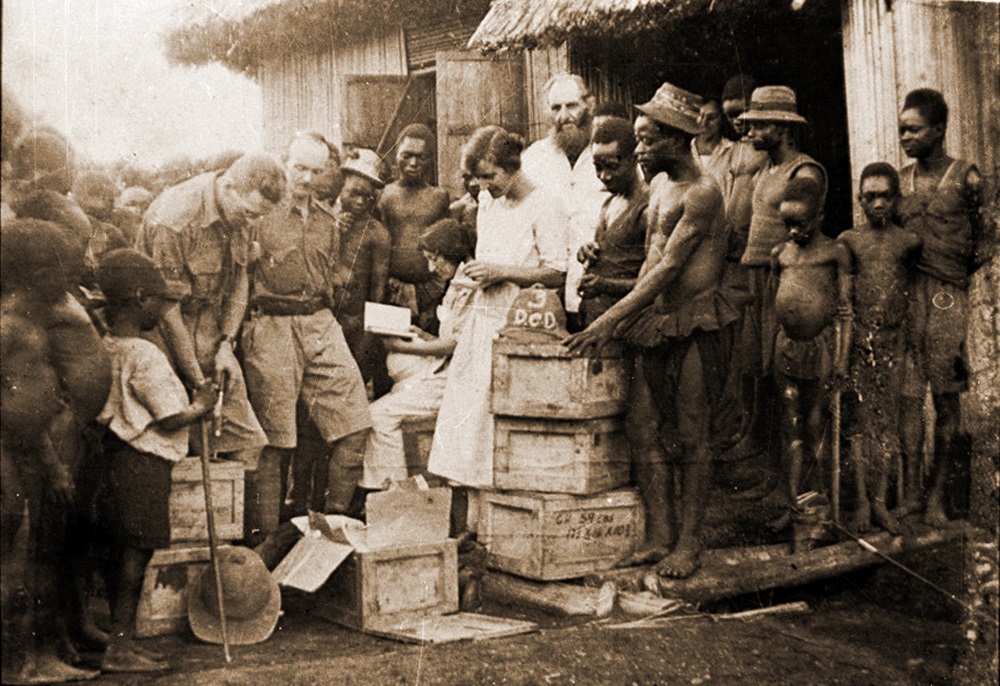
Congo missionaries receiving a shipment of supplies (CT Studd center, c. 1925) *
Results of the Revival
► Unsaved friends were brought to meetings. This resulted in conversions at almost every meeting—sometimes only 2 or 3, sometimes 20, 30 or 40.
► The sale of Scriptures multiplied to 12 times what was the usual rate of selling.
► As soon as the church had its smug spiritual satisfaction removed, with the threat of the loss of dependency on Europeans, they set their faces to God in prayer, and in obedience to evangelizing other tribes. When they did this, God began to bless.
► The believers formed themselves into teams of 12 and went out on evangelizing trips. Those staying behind would be in continual prayer for their success.
► People arrived at Imbai from long distances, seeking this “overflowing joy” that they kept hearing about.
Conclusion
The daily meetings at Imbai had continued for almost 2 ½ months, and the time arrived when the Roberts were required to leave.
During their last church service together the building was packed out, with the atmosphere being filled with hope for the future, knowing that the leadership of the mission station was no longer dependent on the European missionaries, and that God had raised up national leaders to take over the responsibility for the ongoing work of the ministry.
As the vehicle which came to pick up the Roberts began to drive away, with the crowds lining the road, hundreds of voices could be heard echoing through the jungle:
Hallelujah! Mungu iko!” (Hallelujah! God reigns!)
Sources
► Evangelical Awakenings in Africa by J. Edwin Orr
► Floods on Dry Grounds: Revival in the Congo by Eva Stuart Watt
► They Paid the Price by Charlie Searle
*Images courtesy of W.E.C. International
Return to List of Revival Stories
Chet & Phyllis Swearingen
(260) 920-8248
romans1015@outlook.com
Beautiful Feet
P.O. Box 915
Auburn, IN 46706

